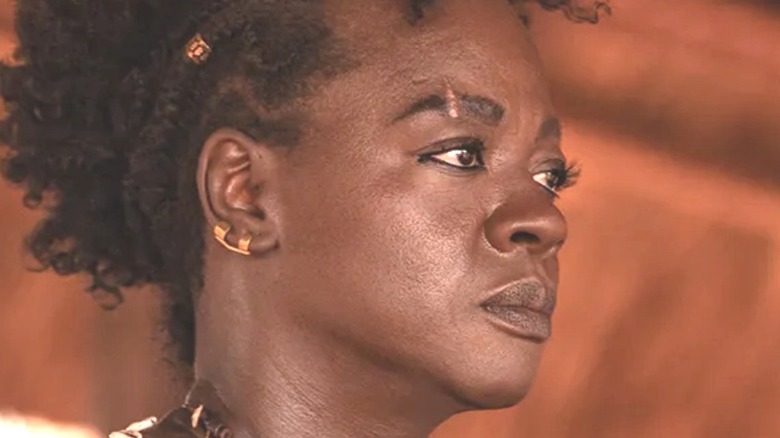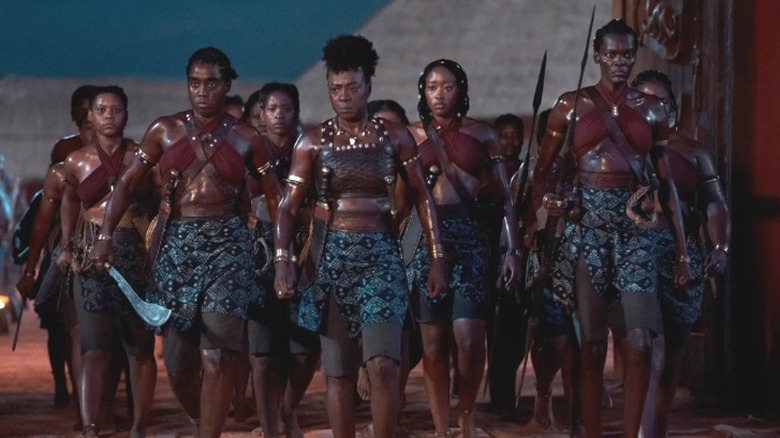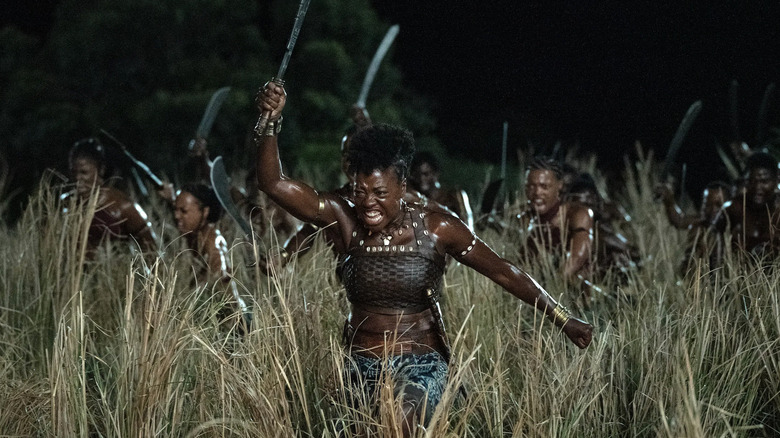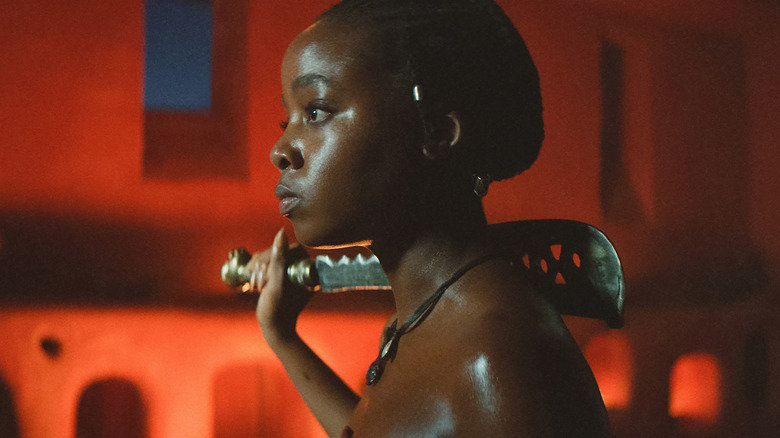Viola Davis And Thuso Mbedu On Playing The Heroes Of The Woman King - Exclusive Interview
"The Woman King," directed by Gina Prince-Bythewood, stars the Academy Award-winning Viola Davis as Nanisca, a fictional general leading the historical all-female Agojie army in the 19th-century war between the kingdom of Dahomey and the Oyo Empire. It's an intense and challenging role for the 57-year-old actress not previously known for leading roles in action movies, and she more than meets the demands of the part. Equally as important to the film's success is Thuso Mbedu's performance as Nawi, a young trainee who serves as an audience viewpoint character, undertakes a classic "Hero's Journey" story, and develops a powerful familial bond with Nanisca.
Looper got the chance to speak with Davis and Mbedu ahead of the premiere of "The Woman King" at the Toronto International Film Festival. In our limited time with the two stars, we talked about the distinctive pitch that got the film off the ground, the intense training required to play these physically demanding parts, and how Davis' documentary viewing habits shaped the film.
A most inspiring pitch
What was it like first being pitched this movie?
Viola Davis: I was pitched the movie when Maria Bello pitched it when she presented me with an award at Skirball Center at National History Museum for Women. Instead of introducing me, she pitched the movie to the audience. I'm telling you, the pitch itself had the same effect as the movie. Everyone stood up and cheered and hollered. That was the first time. That was in 2015.
Thuso Mbedu: I first heard of it in 2019 when I had the honor of having a conversation with Julius Tennon from JuVee Productions, who is also Viola's husband and a producer on the movie. It's a story that I'd never heard of before. I remember saying to my team, "No matter what happens, I would like an opportunity to read for it, even if it means I end up just wiping the screen." It was a story that I believed I would want to be a part of in any capacity.
Training for the action scenes was brutal
You both kick some serious butt in this movie. What was training like?
Davis: Brutal. Let me find a good word for it: brutal. Did I say brutal?
Mbedu: Let me say it again. Brutal.
Davis: Literally, I said to myself, "It's not going to work. We need to sit down with everyone so I could tell them it's not going to work. I can't get my heart rate up like that because I'll have a stroke. I'm over 50." The weightlifting ... Because they wanted me to bulk up, Gabriela Mclain, our trainer, showed me a picture of a woman that had muscles on her shoulders. I said, "Gabi, that's not going to work." She said, "Oh, Viola, it's going to work. Okay, come on. Let's get started."
It got heavier and heavier until it's these 40-pound weights [for an] hour and a half a day. Three and a half hours of martial arts, weaponry training, punching, kicking, the shoulder —
Mbedu: Combat training.
Davis: Yeah — combat training, sprinting on the treadmill ... Listen, the most I've sprinted on the treadmill — and I was proud of myself, when I was in my thirties, early forties — is 7.4 [mph]. I could sprint for about 40 minutes, and I thought that was slick. I was 9.4, 9.4, 10 on the treadmill for three seconds.
Mbedu: I'll take that three seconds any day.
Davis: It was brutal.
Mbedu: I went from struggling with two and a half pounds, literally going, "Gabi, I can't," to lifting 20, 30 pounds. But that didn't go from zero to a hundred. It took work, it took discipline, it took commitment. It took tears — literal tears. Gabi made me cry.
Documentaries were vital for historical accuracy
You're playing characters inspired by history, but they are original characters. How much research did you need to do for these performances?
Mbedu: It was mostly historical research, and then we had to build the characters ourselves. The historical research itself was very minimal. We had one book to go by, "Amazons of Black Sparta: The Women Warriors of Dahomey" [by Stanley Bernard Alpern]. Then [director] Gina [Prince-Bythewood] and Viola sent links for documentaries.
Davis: I watched so many documentaries. I would call Thuso and say, "Did you see this documentary on the Vodun? Did you see this doc?" Djimon Hounsou has a documentary ["In Search of Voodoo: Roots to Heaven"]. Lupita Nyong'o has a documentary on BBC about the Agojie ["Warrior Women with Lupita Nyong'o" from Channel 4]. So [the research] was extensive.
Mbedu: [We were] just filling in the blanks.
"The Woman King" is now playing in theaters.
This interview was edited for clarity.



